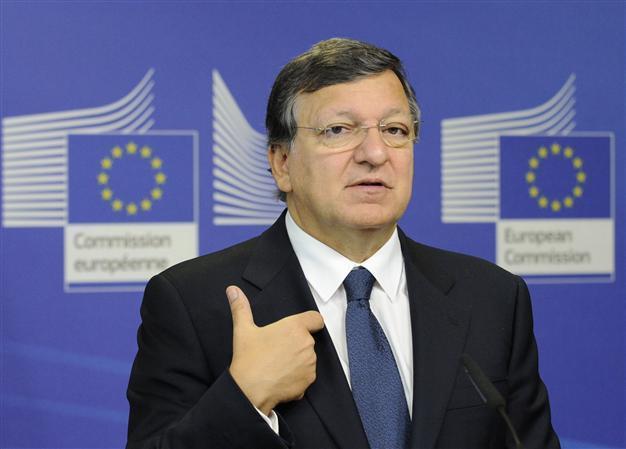EU strikes trade deal with Canada, looks to US
BRUSSELS/LUXEMBOURG - Reuters

Talks between the two sides launched in May 2009 but stalled for months over quotas for Canadian beef and EU cheese. Harper and European Commission President Jose Manuel Barroso met in Brussels to resolve outstanding issues and seal the deal. AFP photo
The European Union and Canada agreed a multibillion-dollar trade pact on Friday that will integrate two of the world's largest economies and pave the way for Europe to clinch an even bigger deal with the United States.
The deal will make Canada the only G8 country to have preferential access to the world's two largest markets, the EU and the United States, home to a total of 800 million people.
"This is the biggest deal our country has ever made," Canadian Prime Minister Stephen Harper said in Brussels, adding that it outstripped the North American Free Trade Agreement between Canada, the United States and Mexico.
Talks between the two sides launched in May 2009 but stalled for months over quotas for Canadian beef and EU cheese. Harper and European Commission President Jose Manuel Barroso met in Brussels to resolve outstanding issues and seal the deal.
In a cheeky touch, chefs served Italian gorgonzola and Greek feta cheese at a four-course lunch laid on for the two leaders to celebrate the deal, which EU trade chief Karel De Gucht called a "template" for negotiations with the United States.
Breakthrough deal
The deal marks a breakthrough for Brussels' free-trade agenda, which had previously achieved smaller agreements with South Korea and Singapore. It is expected to increase bilateral trade in goods and services by a fifth to 25.7 billion euros ($35 billion) a year, according to the latest EU estimates.
Barroso said he hoped the agreement could come into effect from 2015, after EU governments, the European Parliament and Canada's 10 provinces give their blessing.
One significant potential obstacle was cleared on Friday when the government of Quebec, whose dairy industry had been unhappy about the increased EU cheese quota, announced its support for the agreement.
On dairy, the province's government said Ottawa had committed to compensate producers for any losses due to the new import quotas.
However, France signalled some reservations about an influx of Canadian beef under the deal, even if its Munster and Camembert cheese will now win easier access to Canada's supermarket shelves.
"I am waiting for confirmation from the Commission that this accord, particularly in agriculture, does not a set a precedent for talks with the United States," said French Trade Minister Nicole Bricq at a meeting with De Gucht and her peers in Luxembourg.
The Commission is negotiating trade pacts with more than 80 countries on behalf of the bloc's 28 members after the collapse of the marathon Doha round of global trade talks. The delays that dogged the agreement with Canada showed how difficult such deals can be.
Efforts to sign a free trade accord with the United States faced a setback this month when a second round of negotiations was cancelled because of the U.S. government shutdown.
Despite plans to do a deal by the end of next year, the talks have also been overshadowed by reports the United States bugged EU offices under surveillance programmes made public by former U.S. intelligence contractor Edward Snowden, who has taken refuge in Russia.
Still, the EU-Canada agreement should provide a boost for EU-U.S. negotiations. Both deals seek to go far beyond tariff cuts and to reduce transatlantic barriers to business. There are similar sticking points, such as agriculture.
"It's a good signal. I'm a transatlanticist," German Economy Minister Philipp Roesler told Reuters in Luxembourg.
"It's a great basis for all other negotiations, such as the TTIP talks with the United States," he said, referring to the proposed deal by its formal name, the Transatlantic Trade and Investment Partnership.
Tariffs and quotas The EU-Canada pact would eliminate tariffs on almost all goods and services, set larger quotas for EU dairy exports and make it easier for EU carmakers to export vehicles to Canada and for European companies to invest in Canada's uranium sector.
For Canada, pork and beef farmers are perhaps the biggest winners, gaining a bigger share of a huge market once they change production and processing to meet EU rules.
But more European cheese will enter Canada's well-protected market, and for the first time, provincial and municipal governments in Canada will commit to opening their lucrative procurement markets so European companies can compete for contracts alongside locals.
"When you open that up to the European behemoths like Siemens and others, I think it's going to change the landscape," said John Boscariol, who heads the international trade and investment law group at McCarthy Tetrault in Toronto.
The EU will eliminate duties on a range of Canadian agricultural products, from wheat to maple syrup. Canada will be able to export 80,000 tonnes of pork and 50,000 tonnes of beef free of duties to the EU.
But French beef farmers said they were "outraged". "Worst of all, the (European) Commission is blindly preparing for a deal with the United States that will hasten the bankruptcy of farms and jobs in the sector," France's beef farm federation FNB said.
